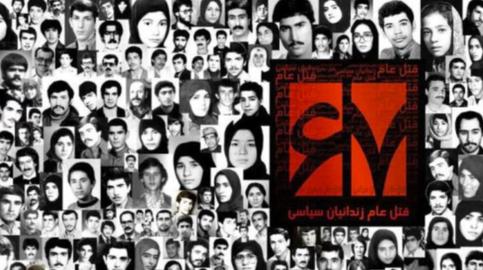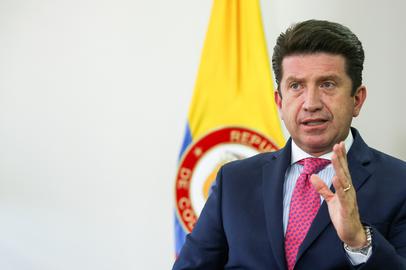The trial of Hamid Nouri, a former Iranian prison official and prosecutor, opened in Sweden in August 2021. Nouri is accused of war crimes and murder in connection with Iran’s 1988 prison massacre. He denies the charges against him.
Since the trial began, the court has heard evidence in 48 sessions, including from former political prisoners. They have given details about the systematic killings that took place in Iranian prisons and detention centers in the summer of 1988 on the orders of then-Supreme Leader Ayatollah Khomeini. Thousands of people were murdered, most of them after sham trials lasting only minutes.
On Tuesday, December 7, witness Mohammad Khodabandehloo gave evidence to the 49th session of the trial in Stockholm.
Khodabandehloo, a former political prisoner who was imprisoned from 1982 to 1989 at Evin, Gohardasht, and Ghezel Hesar prisons and another facility used specifically for political prisoners after being charged with supporting the People’s Mojahedin Organization (MEK), also known as Mojahedin-e Khalq Organization (MKO), told the court that he lost sight in one eye as a result of Hamid Nouri's blows to his face.
Mohammad Khodabandehloo told the court he was transferred from Gohardasht Prison in Karaj — where he encountered Hamid Nouri several times — to Evin Prison along with 157 other inmates. Only seven of them survived.
But Hamid Nouri claimed that he had only been at Gohardasht a handful of times, stating that he worked for Evin Prison from 1982 to 1993.
In his testimony, Khodabandehloo described how he could never get Nouri’s voice out of his mind, and his role as a member of the “death panel” at Evin. "Hamid Abbasi [Hamid Nouri] had a relatively calm, thin, and very different voice from Naserian [Judge Naserian, today known as Judge Moghiseh] and the rest. Together with Naserian, he had a lot of power in Gohardasht Prison. They had prominent roles and ran the prison, with Lashkari and Mortazavi also playing key roles.”
The panel — which comprised of now-president Ebrahim Raisi, Mostafa Pourmohammadi, Hossein-Ali Nayeri, Esmail Shushtari, Morteza Eshraghi, Judge Mohammad Moghiseh (aka Naserian) and Hamid Nouri (aka Abbasi) — carried out the extrajudicial killing of thousands of political prisoners in 1988.
At the time of the executions, Hossein Mortazavi was the director of the prison and Davoud Lashkari was the security and military deputy at Gohardasht Prison.
The witness, who wrote about his experiences in the 1980s in his book Come with Me to the Days of Massacre, also recalled how Hamid Nouri was relatively clean-shaven compared to members of the Revolutionary Guards, who tended to have long beards. Nouri, he said, with his thin face and straight hair, stood out from the others.
“Today your dead body will be taken out of here”
When asked about his encounters with Nouri, Khodabandehloo said, although he was blindfolded most of the time during his imprisonment, he was able to identify him on several occasions, including through the door of the prison visiting area.
He said he also came across Nouri during a prisoners' hunger strike.
"The guard opened the door and saw that I was the only one standing at the corner of the gas room," he recalled in court, referring to a room at Gohardasht Prison where, according to an extensive report by Geoffrey Robertson QC, the regime was conducting tests on poisin gas, which they likely planned to use against political dissidents. “Naserian [Moghesi], Lashkari and Abbasi [Nouri] came into the room. Naserian said in a threatening, loud voice: ‘Today your dead body will be taken out of here’, and started beating me. My blindfold fell and I saw their faces. Abbasi hit me on the head with something in his hands. One of the strong blows from Abbasi hit me in the face and I felt severe pain in the right half of my face."
It was then that Khodabandehloo was mostly blinded in his right eye, he told the court. He could only see light and shadows.
He added that he had not been allowed medical treatment.
The former political prisoner then spoke about the torture and harassment his fellow prisoners endured. "I saw them standing on top of one of my cellmates holding scissors, threatening to cut off his long mustache," he said, referring to Jahanbakhsh Amiri, an Air Force plot from Kermanshah who had also been accused of links to the MEK but who was actually a follower of the Ahl al-Haq group of dervishes. He said someone he called “Haj Mahmoud” held the scissors against Amiri’s neck, and told him: “Let us cut off your mustache or else we will cut your vein.” Khodabandehloo said it was customary for dervishes to grow long mustaches.
Mohammad Khodabandehloo was taken, along with several other prisoners, to the Evin Prison Prosecutor's Office on July 28, 1988, and then forced to appear before the "death panel" the next day.
"In late August, at the height of the executions, I was taken to court, but at one point, I jumped out of the line and I was returned to prison," he told the court. "My friends said I would get caught at night when they started counting the prisoners. When they started counting, I hid behind a fellow inmate. Naserian came to the prison and started questioning the prisoners; I also saw Abbasi and Haj Mojtaba Halvai."
European Leaders Call for 1988 to be Recognized as Genocide
The trial against Hamid Nouri, which began in August 2021, will continue until April 2022.
As the 49th session of the trial of the former prosecutor got underway, more than 100 members of the European Parliament, including 14 former ministers and foreign ministers, called on the European Union and member states to adopt a firm policy as part of its nuclear negotiations with the government of the Islamic Republic and to officially recognize the 1988 massacre in Iran as genocide and "a crime against humanity."
The murders followed a fatwa issued by Ayatollah Ruhollah Khomeini, the founder of the Islamic Republic, which ordered the execution of political prisoners — and especially those affiliated with the MEK.
Their statement also highlighted the involvement of the current president of Iran, Ebrahim Raisi, and his role on the death panel as well as the arrest, torture, and disappearance of thousands of people in November 2019 during his tenure as head of the judiciary.
In his defense, Hamid Nouri dismissed Khomeni’s fatwa to kill political prisoners as forgery, and accused “communists” and members of the MEK of orchestrating a campaign of lies.
Related coverage:
Ex-Prisoner at Hamid Nouri Trial Recalls Narrow Escape From Death Squads
Prosecutors Describe Prison 'Corridor of Death' at Hamid Nouri Trial
Iranian Ex-Prisoners Recall 'Courier of Death' Hamid Nouri Ahead of Sweden Trial
visit the accountability section
In this section of Iran Wire, you can contact the officials and launch your campaign for various problems

























comments